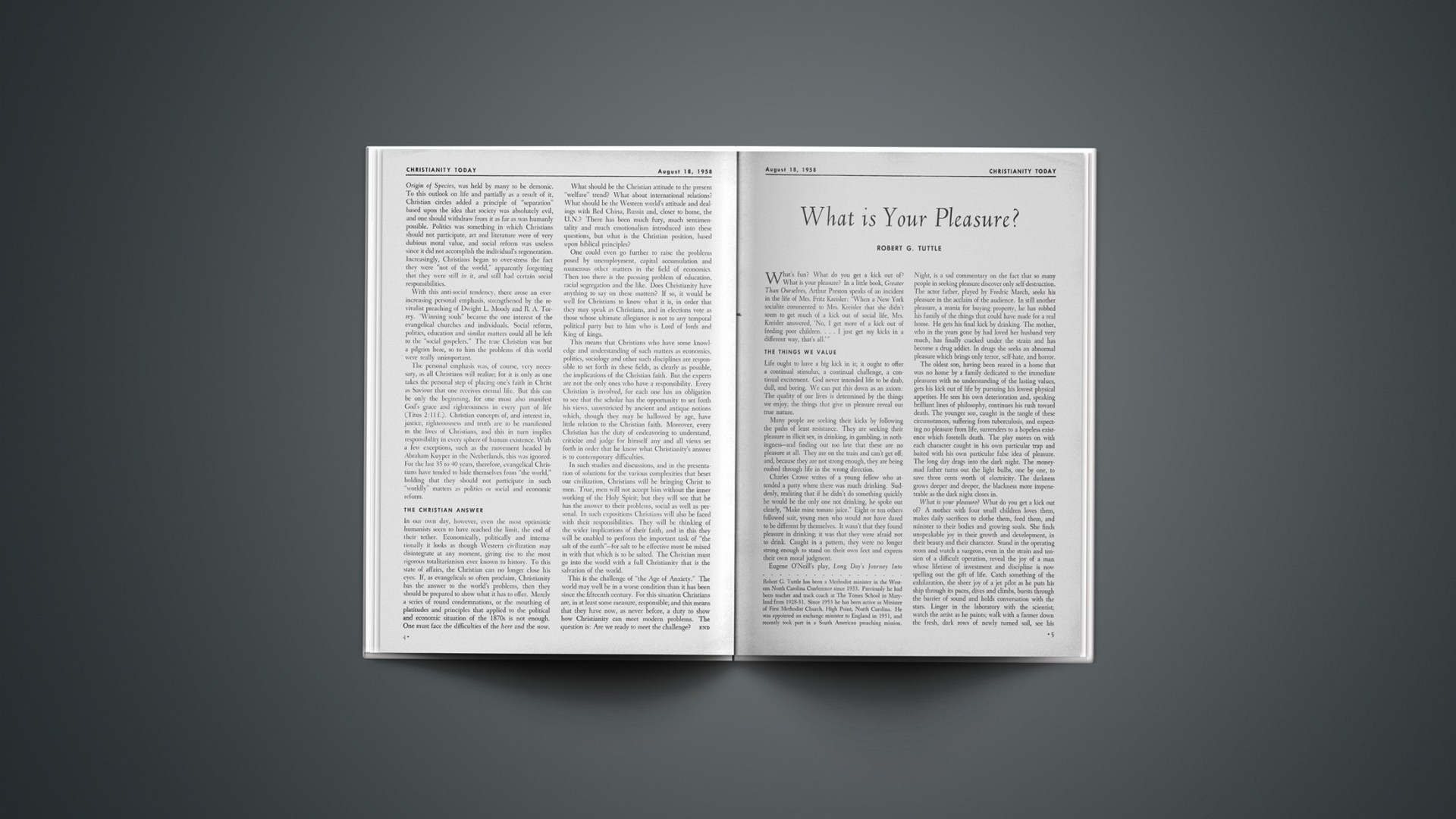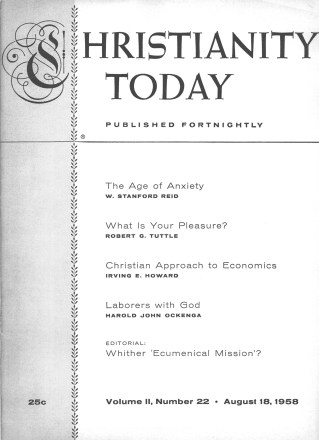What’s fun? What do you get a kick out of? What is your pleasure? In a little book, Greater Than Ourselves, Arthur Preston speaks of an incident in the life of Mrs. Fritz Kreisler: “When a New York socialite commented to Mrs. Kreisler that she didn’t seem to get much of a kick out of social life, Mrs. Kreisler answered, ‘No, I get more of a kick out of feeding poor children.… I just get my kicks in a different way, that’s all.’ ”
The Things We Value
Life ought to have a big kick in it; it ought to offer a continual stimulus, a continual challenge, a continual excitement. God never intended life to be drab, dull, and boring. We can put this down as an axiom: The quality of our lives is determined by the things we enjoy; the things that give us pleasure reveal our true nature.
Many people are seeking their kicks by following the paths of least resistance. They are seeking their pleasure in illicit sex, in drinking, in gambling, in nothingness—and finding out too late that these are no pleasure at all. They are on the train and can’t get off; and, because they are not strong enough, they are being rushed through life in the wrong direction.
Charles Crowe writes of a young fellow who attended a party where there was much drinking. Suddenly, realizing that if he didn’t do something quickly he would be the only one not drinking, he spoke out clearly, “Make mine tomato juice.” Eight or ten others followed suit, young men who would not have dared to be different by themselves. It wasn’t that they found pleasure in drinking; it was that they were afraid not to drink. Caught in a pattern, they were no longer strong enough to stand on their own feet and express their own moral judgment.
Eugene O’Neill’s play, Long Day’s Journey Into Night, is a sad commentary on the fact that so many people in seeking pleasure discover only self-destruction. The actor father, played by Fredric March, seeks his pleasure in the acclaim of the audience. In still another pleasure, a mania for buying property, he has robbed his family of the things that could have made for a real home. He gets his final kick by drinking. The mother, who in the years gone by had loved her husband very much, has finally cracked under the strain and has become a drug addict. In drugs she seeks an abnormal pleasure which brings only terror, self-hate, and horror.
The oldest son, having been reared in a home that was no home by a family dedicated to the immediate pleasures with no understanding of the lasting values, gets his kick out of life by pursuing his lowest physical appetites. He sees his own deterioration and, speaking brilliant lines of philosophy, continues his rush toward death. The younger son, caught in the tangle of these circumstances, suffering from tuberculosis, and expecting no pleasure from life, surrenders to a hopeless existence which foretells death. The play moves on with each character caught in his own particular trap and baited with his own particular false idea of pleasure. The long day drags into the dark night. The money-mad father turns out the light bulbs, one by one, to save three cents worth of electricity. The darkness grows deeper and deeper, the blackness more impenetrable as the dark night closes in.
What is your pleasure? What do you get a kick out of? A mother with four small children loves them, makes daily sacrifices to clothe them, feed them, and minister to their bodies and growing souls. She finds unspeakable joy in their growth and development, in their beauty and their character. Stand in the operating room and watch a surgeon, even in the strain and tension of a difficult operation, reveal the joy of a man whose lifetime of investment and discipline is now spelling out the gift of life. Catch something of the exhilaration, the sheer joy of a jet pilot as he puts his ship through its paces, dives and climbs, bursts through the barrier of sound and holds conversation with the stars. Linger in the laboratory with the scientist; watch the artist as he paints; walk with a farmer down the fresh, dark rows of newly turned soil, see his pleasure as the first green shoots break through into the light of the sun and when the harvest is abundant.
A Kind Of Ecstatic Joy
The early Christians discovered a kind of ecstatic joy. They got a kick out of life. They knew the depths of lasting pleasure in serving the living Christ who had redeemed them and who now possessed them. They worked joyfully with God in turning a world upside down and reversing the course of history. Did not Jesus say, “Pleasure is more than food—joy more than clothing!”
What is your pleasure? Poor is the man whose only “pleasure is a summer’s day.” For the day is short, the night draws nigh, the darkness closes in. Fortunate is he who, because of an inner light, finds joy at midnight, and sings from an overflowing heart on a winter’s day.
Principles Of Blessedness
In the Beatitudes, Jesus reveals the basic principles of lasting happiness. You might boil it down into this: Grab and you lose; give and you win! Jesus makes his points clear and simple (Phillips’ translation, Matthew 5):
“Happy are the humble-minded.” They do not take too much for granted. They still have a heart open for the great experiences of life. They do not drive away their fellow men by a spirit of arrogance.
“Happy are those who know what sorrow means.” They discover sympathy and compassion. They enter into a dimension of life that has depth and roots. They have faced up to their own inadequacy and rely upon the lasting reality in God.
“Happy are those who claim nothing.” These are the meek who have surrendered a sense of personal privilege and prejudice. They have a spirit of reverence toward life, toward God.
“Happy are those who are hungry and thirsty for goodness, they shall be fed.” They shall find lasting satisfactions. They shall seek and find. Life will be to them a venture and a quest, never fully accomplished, but with increasing satisfactions all along the way.
“Happy are the kindhearted.” These are the merciful. They are not bound by legalism; they are willing to go beyond the limits of sheer justice in dealing with their fellow men. They have learned to forgive. They love even their enemies. Thus they have no enemies, and live only in a world of people who need their help and their love.
“Happy are the pure in heart.” These are the pure-hearted, the clean-minded, the wholesome-spirited. Their lives are not poisoned by sordidness and shame. Their influence made ineffective by unworthiness of character.
“Happy are those who make peace.” Cursed are those who stir up strife, who set the fires of hate. Miserable are they who damn innocence by repeating unworthy rumor. The peacemakers bind up the wounds, bring about understanding, put out the fires of bitterness.
“Happy are those who have suffered persecution for the cause of goodness.” Happy are they who have made sacrifices for the greater good. Joyful are they who, at great cost to themselves, are lifting the human race to higher levels of sanity and wholesomeness. Fortunate are the pioneers in the kingdom of God.
Foundation Of Pleasure
These qualities are the foundations of joyful, zestful living. Jesus spoke as a specialist when he declared these principles of blessedness. If we are uncertain, we may test in our own lives any one of these axioms. If we face the Beatitudes honestly, we know in our hearts that this is the way of lasting satisfaction. It comes at a great price, but what real joy does not?
Jesus kept speaking of joy. Religion at its best always arises out of the negative into the positive and creative. If you don’t have joy in your religion, you don’t have what Jesus taught. The old Psalm is still true: “His delight is in the law of the Lord.”
Christian joy is a progressive thing. It arises from level to level. When an old and worthy satisfaction loses its charm, it does not mean the end of joy. Other and higher levels of experience beckon to us from above. As Helen Keller expressed it: “When one door of happiness closes, another opens; but often we look so long at the closed door that we do not see the one which has been opened for us.”
Jesus revealed the foundation of his own life: “My (pleasure) is to do the will of him that sent me.” With him I discover “the unsearchable riches” of life! At the end of his journey Jesus passed the fulness of his life on to his disciples: “My (pleasure) I give unto you—Not as the world giveth, give I unto you—My (pleasure) I give unto you that your (pleasure) might be full.”
Mention Of God’S Name
The quiet mention of God’s name,
In an hour torn and grey,
Can warm a troubled heart with peace—
Can light the darkest day!
The quiet mention of His name
Can cause new hope to flower,
Can lead the way to paths made bright
By His own love and power!
ELSIE MCKINNON STRACHAN
Robert G. Tuttle has been a Methodist minister in the Western North Carolina Conference since 1933. Previously he had been teacher and track coach at The Tomes School in Maryland from 1928–31. Since 1953 he has been active as Minister of First Methodist Church, High Point, North Carolina. He was appointed an exchange minister to England in 1951, and recently took part in a South American preaching mission.










